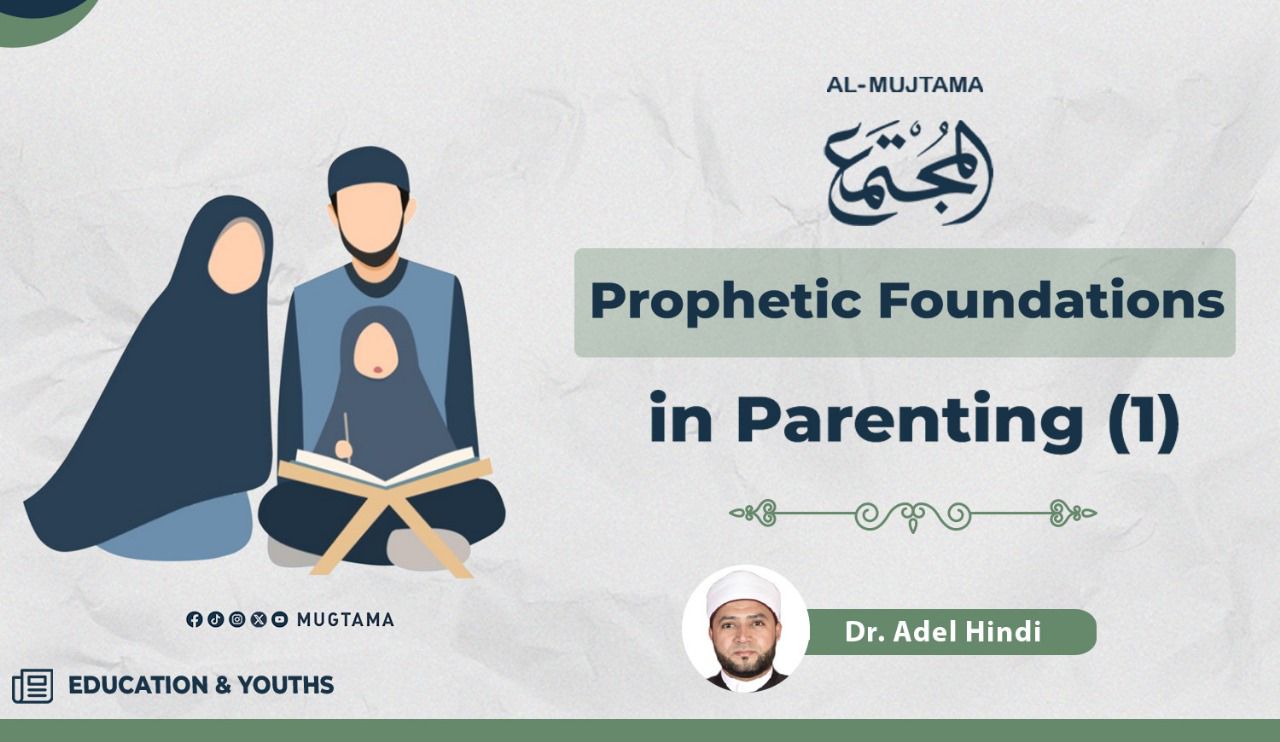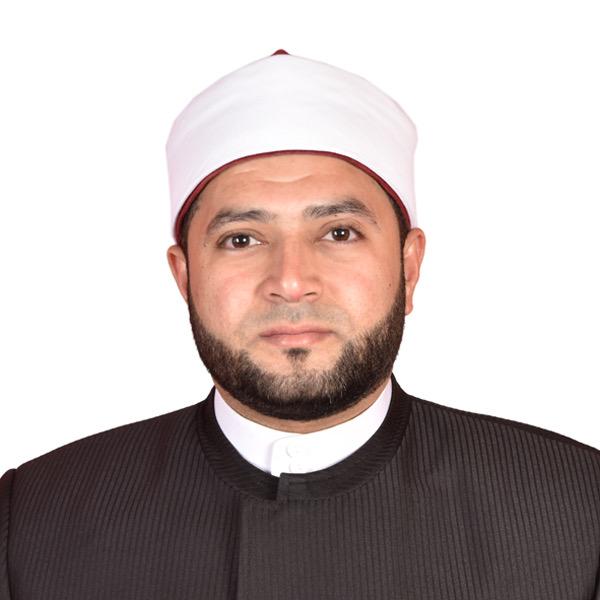Prophetic Foundations in Parenting (1)

There is no doubt that parental upbringing
is one of the most important pillars in building societies. It is the
foundation in which values and principles are instilled, shaping the character
of future generations. At the forefront of the educational approaches that have
proven their effectiveness through the ages stands the Prophetic method of
upbringing — a comprehensive model that combines mercy with firmness, guidance
with practice, and love with sound nurturing.
The Prophet Muhammad peace be
upon him laid down a clear roadmap for fathers and mothers,
reflecting their sound natural disposition and aligning with the child’s nature
and psychological and intellectual needs. He peace be upon him would educate by
example before speech, surround the children of the Ummah with compassion and
tenderness, guide them with wisdom and good exhortation, and instill in them
values of responsibility and independence — contributing to the preparation of
a generation capable of carrying the message and building civilization.
In a series of educational and da‘wah
articles, we shed light on the key foundations of the Prophetic method in
parental upbringing and explore how to apply it in our contemporary reality,
ensuring a successful upbringing that strikes the right balance between
spiritual values and life practices. This is because the Prophet’s, peace be
upon him, method as an educator is the most
comprehensive, superior, perfect, and pure of all practical methods the world
has known through the ages.
Upbringing and Building the Human Being
Upbringing is the cornerstone in
shaping the human personality. Educators and reformers agree that one of the
most important lifelines for a society is building the human being — something
that can only be achieved through sound and beneficial educational features.
For this very purpose, the sending of prophets and the mission of messengers
was ordained; for after calling people to worship Allah alone, the mission of
prophets and messengers lies in educating nations and reforming humanity in
conduct and character.
Modern Challenges in Upbringing
Indeed, upbringing is among the most
important means of both public and private reform. Raising the emerging
generations upon upright conduct and the straight path is the goal of reformers
in every time and place. However, with the diversity and complexity of problems
in our era, the process of upbringing has become one of the most difficult and
challenging tasks, making it essential to search for a comprehensive and sound
approach to raising sons and daughters.
When examining past and modern approaches
to upbringing, one finds a ray of light shining upon humanity from among
methods that may be afflicted with many deficiencies and deviations: the method
of the Prophet — the exemplary model and ideal guide. As the Qur’anic verse
expresses: "There has certainly been for
you in the Messenger of Allah an excellent pattern" (Al-Ahzab
33: 21).
The noble Prophetic method is distinguished
as the practical application of the Qur’an, in full harmony with reason, innate
nature, and divine law. The biography of the Prophet peace be
upon him is indeed the most comprehensive, superior, perfect,
pure, distinguished, and impactful life story the world has ever known.
Therefore, the foundation of this research is the noble hadith and the
Prophet’s peace be upon him practical applications
of the features and landmarks of successful upbringing.
In his guidance peace be
upon him lies provision for educators and guardians alike —
fathers, mothers, and teachers — teaching them to embody the qualities of great
educators: wisdom, mercy, kindness, forbearance, and gradualism. Naturally,
such traits generate respect, appreciation, positive expectations,
encouragement, unconditional love, friendship, and a balanced relationship
between the educator and the one whose conduct is being shaped.
Characteristics of the Prophetic Method in
Parental Upbringing
The Prophetic method is distinct from all
others in the following ways:
First: The infallibility of
Prophet Muhammad peace be upon him. While our Messenger
was human, he was a human who received revelation and spoke not from his own
inclination, as the Qur’an informs us: "Nor
does he speak from [his own] inclination. It is not but a revelation
revealed" (An-Najm 53: 3–4). Other educators are not
infallible and are prone to error, as Allah Almighty says: " Then do
they not reflect upon the Qur’an? If it had been from [any] other than Allah,
they would have found within it much contradiction" (An-Nisa 4: 82). Thus, we are speaking of an
infallible method — one that never deviates from the divine purpose or lofty
aim of reform and change.
Second: His living the human
reality and the comprehensiveness of his method, in addition to its ease of
application, demonstrated through:
1. His view of the human being as a human
being: neither elevating him to the level of
angels, nor degrading him to the level of animals; not imposing isolation or
monasticism, nor sinking him to the lowest depths of immorality. This balanced
view of the human being ennobled the Prophetic method. In the authentic hadith,
when three men came to the houses of the Prophet’s wives asking about his
worship, they seemed to think it insufficient. They said: “Where are we
compared to the Prophet when Allah has forgiven his past and future sins?” One
said: “As for me, I will pray all night and never sleep.” Another said: “I will
fast continuously and never break my fast.” The third said: “I will abstain
from women and never marry.” The Prophet peace be upon him came to them and said: “Are you the people who said such and such? By God, I am
the one of you who fears and reverences God most, yet I fast and I break my
fast; I pray and I sleep; and I marry women. He who is displeased with my sunna
has nothing to do with me.” (Sahih al-Bukhari and Muslim). (1)
2. Ease of application: This method was implemented among rough and harsh
Bedouins, transforming them into leaders of nations and peoples, elevating them
above all others.
Third: His guidance peace be
upon him embodied the perfection of character. The Prophet peace be
upon him described his mission, saying: “I was sent to
perfect good character” (2) (Musnad Ahmad). Thus,
we must invest in the righteous character found in his guidance, taking lessons
from his upright moral method so that our societies may be reformed and
illuminated by the light of the Prophetic way.
Fourth: Allah commanded
following him. Following him is an act of worship, walking in his footsteps
brings blessings, and adhering to his way of life is a great opportunity to
attain immense reward in this life and the next.
Thus, al-Khatib al-Baghdadi said: “It is
befitting for the student of hadith to distinguish himself in all matters by
applying the traditions of the Messenger of Allah peace be
upon him as much as he can, and to impose the Sunnah upon
himself.” Ibrahim al-Harbi said: “It is befitting for a man, when he hears
something from the etiquettes of the Prophet peace be upon him, to adhere to it.”
Sufyan al-Thawri said: “If you can avoid scratching your head except in
accordance with an example from the Sunnah, then do so.” (3) His
guidance is followed in worship, and the Muslim walks in his path to draw
closer to Allah — a reality that is only found with him peace be
upon him.
Fifth: The necessity of
taking from him without prior biases or preconceived notions. Some may approach
his guidance seeking confirmation for their preexisting ideas about upbringing.
This is incorrect, for the Prophet peace be upon him is the standard from
which we derive, not the one who is judged by other standards. (4)
Sixth: The need for the ideal
model to build the personality of the modern human being. This can only be
fulfilled by the Messenger of Allah peace be upon him — through his words,
movements, actions, and conduct. His Sunnah and Seerah, in all their details,
have a profound impact on the lives of preachers and educators. Memorization
alone is insufficient, as Sheikh Muhammad al-Ghazali said in Fiqh al-Seerah:
“There are many parrots that repeat what they hear without understanding. We
may see young children delivering — with skill and acting — eloquent speeches
of famous politicians and leaders, yet neither the children — by memorizing the
words of the scholars — have become men, nor have parrots turned into human
beings. You may find one who memorizes, understands, debates, and overcomes
opponents, yet his knowledge within is like veins of gold within neglected
rocks — neither inspiring good nor deterring evil.” (5)
Thus emerges our need for the method of our
beloved Prophet peace be upon him in parental
upbringing, especially in an age when some people’s concepts have been confused
by the desires of those hostile to the Muslim family. It is therefore essential
to highlight this method and its practical foundations, which unite the
experience of divine revelation with human experience.
Here then arises the question: If this is
the Prophet peace be upon him with his noble method,
what are the features of his approach to parental upbringing? This, God willing,
is what we will discuss in our next article.
Read Also:
·
Core Concepts of Islamic Upbringing
·
Faith Stations on the Path of Upbringing
-------------------------------------------------------------
(1) Ṣaḥīḥ al-Bukhārī: Book of Marriage, Chapter:
Encouragement Towards Marriage, Hadith No. (5063).
(2) Al-Adab al-Mufrad:
Muḥammad ibn Ismāʿīl ibn Ibrāhīm ibn al-Mughīrah al-Bukhārī, Abū ʿAbdullāh (d. 256 AH), edited by Muḥammad Fuʾād ʿAbd al-Bāqī, Chapter: Good Character, Hadith No. (273), p. 104,
3rd edition / 1409 AH = 1989 CE, Dār al-Bashāʾir al-Islāmiyyah – Beirut. The editor
graded it as “Ṣaḥīḥ,” and it has other narrations in Mālik’s al-Muwaṭṭaʾ, Aḥmad’s al-Musnad, and al-Ḥākim’s al-Mustadrak ʿalā al-Shaykhayn, about which al-Ḥākim said: “A Ṣaḥīḥ hadith according to the criteria of Muslim.”
(3) Al-Jāmiʿ li Akhlāq al-Rāwī wa Ādāb al-Sāmiʿ: Abū Bakr Aḥmad ibn ʿAlī ibn Thābit ibn Aḥmad ibn Mahdī al-Khaṭīb al-Baghdādī (d. 463
AH), edited by Dr. Maḥmūd al-Ṭaḥḥān, Vol. 1, p. 142, Dār al-Maʿārif, Riyadh (no date).
(4) See: al-Tarbiyah
al-Nabawiyyah, Dr. Muḥammad ibn ʿAbdullāh al-Duwīsh, p. 28, 1st edition
/ 1437 AH, King Fahd National Library – Riyadh (adapted).
(5) Fiqh al-Sīrah:
Shaykh Muḥammad al-Ghazālī, p. 71, 1st edition / 1427 AH, Dār
al-Qalam – Damascus.











